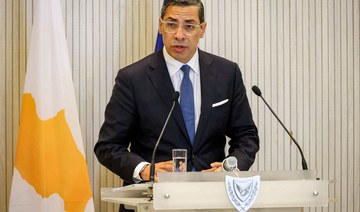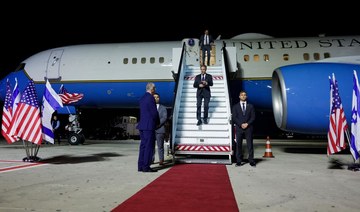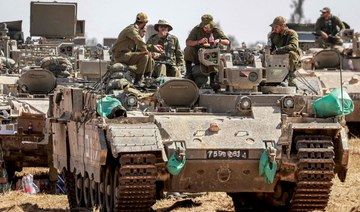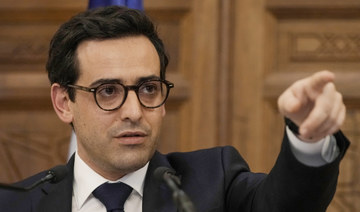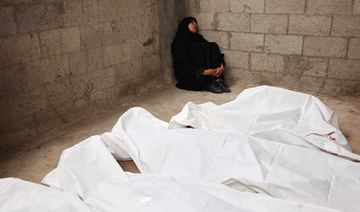LIMASSOL: Hours before the masked men came, brandishing Cypriot flags and molotov cocktails, hushed whispers of the imminent rampage travelled down the Limassol seafront strip home to many migrant-owned businesses.
Egyptian restaurant owners rushed to bring their water pipes indoors, and a Vietnamese vendor quickly cleared their street displays of greens and sugar cane stalks.
But they couldn't hide the distinct cultural heritage each of them has proudly embraced as they have built their livelihoods on the Mediterranean island.
Egyptian restaurateur Mohammed el-Basaraty, 38, recalled, "I was standing with a neighbour and she told me to leave... 'because if they see you, a foreigner, they will beat you', she said".
He stowed away at the back of the restaurant as the men smashed the windows of the business he had built with his life savings.
"We began to hear the sound of glass breaking... After that I smelled the smell of smoke and fire."
The attack early this month came amid a surge in violence against migrants in Cyprus, which last year recorded the European Union's highest proportion of first-time asylum seekers relative to population.
Experts blame the increased mainstreaming of xenophobia in Cypriot politics and media, fuelled by the spread of disinformation and the mismanagement of the large number of people trying to reach Europe.
Just days earlier, locals near the western city of Paphos had launched a similar attack on migrants after years of friction with the hundreds of mostly Syrians living in a condemned apartment complex.
Men with crowbars and sticks could be seen in videos shared on social media, shouting "out, out" as they marched through the streets. Twenty-one people were arrested, including 12 Syrians.
Police had earlier raided the building to clear it of its residents after allegations of electricity theft spread on social media.
Despite that precedent, as well as a heavy police presence ahead of the Limassol protest, residents say little was done to intervene.
"They were more than 600 people," said Adel Hassan, 76, a local resident. "How many did the police arrest? Just 13?"
Police did not immediately respond to an AFP request for comment, but police chief Stelios Papatheodorou acknowledged before parliament that the response was "slow".
Some observers have voiced suspicions that hidden under the black balaclavas were members of the extreme right-wing party Elam, a group initially formed out of Greece's now-outlawed neo-Nazi Golden Dawn.
Elam did not respond to AFP's request for comment, but the group has repeatedly denied involvement in the violence.
Their staunch anti-immigration stance has helped them gain followers, with leader Christos Christou winning six percent of the vote in February's presidential election.
But Giorgos Charalambous, a professor focused on European party politics and mobilisation at the University of Nicosia, said the violence could also be attributed to smaller far-right groups that accuse Elam of becoming too soft on immigration since achieving mainstream success.
Charalambous says overall "hate speech" has become normalised across the political spectrum, creating an atmosphere conducive to the attacks that he described as "pogroms".
"Individuals and politicians that spread fake news and racist rhetoric about immigration also come from more mainstream centre-right parties," he told AFP.
Cyprus has been at the frontlines of large-scale migrant arrivals in recent years, which have seen the government take harsher steps, including increased pushbacks, according to the Cyprus Refugee Council.
The UN refugee agency last month expressed concern after more than 100 Syrians were deported to Lebanon without adequate screening of their asylum applications.
Such steps, buffeted by the crackdown near Paphos, may have emboldened far-right activists to turn their long-standing grievances into action, observers said.
The violence has "never escalated to this, although I can't say that we haven't seen it coming," said Corina Drousitiou of the Cyprus Refugee Council.
She largely blamed the growing anti-migrant sentiment on inadequate measures by the authorities, particularly the previous government, also pointing to "the language used in official statements... which was quite evidently xenophobic".
Responding to a request for comment, the interior ministry spokesperson in the current government, which was formed in March, blamed the unrest on "accumulated problems that were exploited by anonymous accounts on social media platforms".
"In no case did the official side express any racist rhetoric," Elena Fysentzou told AFP.
For many foreigners on the island, the damage is already done.
"Things have changed. There isn't the sense of safety that we used to feel," Sayed Samir, the owner of Mr Habibi, one of the ransacked restaurants, told AFP.
It took Chu Thi Dao years of hard work to scrape together enough money to open her convenience store overlooking the Limassol waterfront.
"She wanted a better life for her children," her 17-year-old daughter, Flora, told AFP.
A video of the 35-year-old Vietnamese woman crying at her shop after the attack quickly went viral across the island, drawing solidarity and support from the community and government.
Like the Vietnamese shop, the majority of the businesses that were attacked are owned by people who had fled either unrest or dire economic conditions to settle in Cyprus years ago.
Towards the end of the conversation, Flora's eyes start to glaze over with tears. "I want to stay here and live with my mom and family," the teenager said, struggling with the notion that this dream may now be shattered.
Cyprus migrants face wave of attacks as hostility brews
https://arab.news/2wjrw
Cyprus migrants face wave of attacks as hostility brews
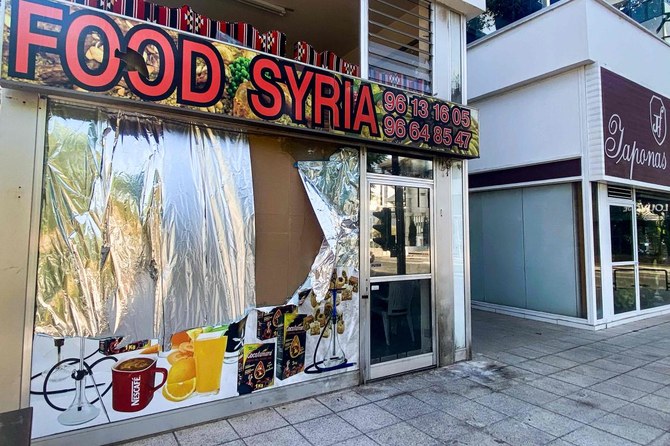
- Egyptian restaurant owners rushed to bring their water pipes indoors
- A Vietnamese vendor quickly cleared their street displays of greens and sugar cane stalks
US surgeon in Gaza: nothing prepared me for scale of injuries
- Around 70 percent of the surgeries he performed were on injuries caused by shrapnel
- Team would deal with 40-60 patients a day
Dozens of patients a day. Most of them young. Most facing complicated injuries caused by shrapnel. Most ending up with amputations.
“Vascular surgery is really a disease for older patients and I would say I had never operated on anybody less than 16, and that was the majority of patients that we did this time around,” Shariq Sayeed, from Atlanta, Georgia, told Reuters in Cairo.
“Most were patients 13, 14, 15, 16 and 17 years of age. Mostly shrapnel wounds, and that was something I have never dealt with, that was something new.”
In his stint at the European Hospital in Gaza, Sayeed said his team would deal with 40-60 patients a day. The vast majority were amputation cases.
“And unfortunately there is a very high incidence of infection as well so once you have an amputation that doesn’t heal, you end of getting a higher amputation,” he said.
Around 70 percent of the surgeries he performed were on injuries caused by shrapnel, the rest mostly from blast injuries and collapsing buildings.
Ismail Mehr, an anaesthesiologist from New York State, who led the Gaza mission, said the volunteer medics were “speechless at what we saw” when they arrived this month in southern Gaza.
Mehr is chairman of IMANA Medical Relief, a program that focuses on disaster medical relief and health care support and has provided treatment to over 2.5 million patients in 34 countries and counting.
He has been to Gaza several times in the past, but could not imagine what he saw this time: “Truly everywhere I saw was destruction in Khan Younis, not a single building standing.”
Out of 36 hospitals that used to serve more than 2 million residents, just 10 were somewhat functional by early April, according to the World Health Organization.
Health facilities lacked medical supplies, equipment, staff, and power supplies, Mehr said. His biggest fear now is an expected Israeli assault into the southern city of Rafah, where half of Gaza’s 2.3 million people have sought shelter.
“I hope and I pray that Rafah is not attacked,” he said. “The health system will not be able to take care of that. It will be a complete catastrophe.”
UAE braced for severe weather, task force on high alert

DUBAI: Challenging weather is again expected in the UAE, with parts of the country’s east coast set to experience strong winds.
The National Emergency Crisis and Disaster Management Authority said gusts of up to 40 kph were likely to impact the area on Thursday.
While the NCM forecasts less severe conditions than those in April, it has warned residents to expect rain and storms over the next two days. There is a possibility of hail in the eastern regions, possibly extending to some internal and western areas.
Clouds are expected to decrease on Friday and Saturday, with possible light to medium rain which may be heavier in some southern and eastern regions.
Government agencies are coordinating with the Joint Weather and Tropical Assessment Team to monitor developments, said a statement from the NCM.
The teams will assess the potential impact of weather conditions and implement proactive measures where necessary.
Dubai’s government announced all private schools in the UAE would switch to remote learning on Thursday and Friday as a precaution.
Authorities have urged the public to exercise caution, adhere to safety standards and guidelines, refrain from circulating rumors, and rely on official sources for information.
The UAE is still recovering from last month’s storms which caused widespread flooding, submerging streets and disrupting flights at Dubai International Airport.
Blinken urges Hamas to agree Gaza truce as he meets Israel leaders
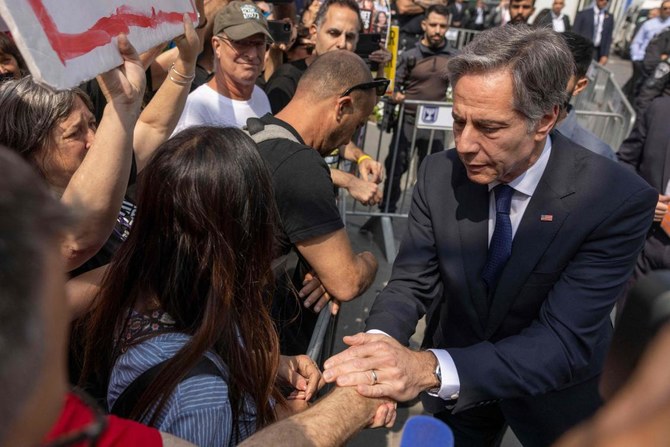
- Washington has heightened pressure on all sides to reach a ceasefire
- Israel said it would wait for Hamas’ response to the truce before sending delegation to Cairo
JERUSALEM: Top US diplomat Antony Blinken urged Hamas to accept a truce in the Gaza Strip on Wednesday, after Israeli Prime Minister Benjamin Netanyahu vowed to send troops into its far southern city of Rafah.
Washington has heightened pressure on all sides to reach a ceasefire — a message pushed by Blinken, who was on his seventh regional tour since the Gaza war broke out in October.
An Israeli official told AFP the government “will wait for answers until Wednesday night,” and then “make a decision” whether to send a delegation to indirect talks being brokered by US, Egyptian and Qatari mediators in Cairo.
The Palestinian militant group said it was considering a plan for a 40-day ceasefire and the exchange of scores of hostages for larger numbers of Palestinian prisoners.
Hamas, whose envoys returned from Cairo talks to their base in Qatar, would “discuss the ideas and the proposal,” said a Hamas source, adding: “We are keen to respond as quickly as possible.”
Blinken put the ball squarely in Hamas’s court.
“There is a very strong proposal on the table right now. Hamas needs to say yes, and needs to get this done,” he said.
But analysts questioned whether Hamas would sign up to another temporary ceasefire like the week-long truce that saw more than 100 hostages released in November, knowing that Israeli troops could resume their onslaught as soon as it was over.
“I’m pessimistic about the option of Hamas agreeing to a deal that doesn’t have a permanent ceasefire baked into it,” said Mairav Zonszein, senior analyst on Israel-Palestine at the International Crisis Group.
Zonszein said the three countries brokering the truce talks had their own reasons for trying to bounce the warring parties into a deal.
“The US and Egypt and Qatar all have very strong interests of their own, for various reasons, why they’re trying very hard now to pressure both sides into agreeing to a deal.
“And I think they believe that if they’re able to get an initial deal and a pause, that they can try to build on that,” he said.
Potential Rafah incursion
Hours before Blinken landed in Tel Aviv, Netanyahu fired a shot across his bows, vowing to send Israeli ground troops into Rafah despite repeated US warnings of the potential for heavy casualties among the 1.5 million civilians sheltering in the city.
“We will enter Rafah and we will eliminate the Hamas battalions there with or without a deal,” the right-wing premier told hostage families, his office said.
Ahead of what promised to be a difficult meeting with Netanyahu in Jerusalem, Blinken too met privately with hostage relatives in Tel Aviv.
In rare scenes for the top US diplomat, who has faced furor at home and abroad over the administration’s support for Israel in its campaign against Hamas, Blinken was greeted outside his Tel Aviv hotel by Israeli demonstrators waving US flags.
Blinken told them that freeing the hostages was “at the heart of everything we’re trying to do.”
The estimates that 129 Israelis remain captive in Gaza, 34 of whom are presumed dead.
Many of their families have expressed hope that US pressure may force Netanyahu to agree a deal for their release.
Mideast tour
On the previous leg of his regional tour in Jordan, Blinken said a Gaza truce and the redoubling of aid deliveries went hand in hand.
A truce is “the most effective way to relieve the suffering” of civilians in Gaza, he told reporters near Amman.
Blinken saw off a first Jordanian truck convoy of aid heading to Gaza through the Erez crossing reopened by Israel.
“It is real and important progress, but more still needs to be done,” he said.
UN agencies have warned that without urgent intervention, famine looms in Gaza, particularly in northern areas which are hardest to reach.
A US-built floating pier on Gaza’s coast is expected to be completed later this week, said Cyprus, the departure point for the planned “maritime corridor.”
Blinken said the pier would “significantly increase the assistance” but was not “a substitute” for greater overland access.
In northern Gaza’s Beit Lahia, across from Erez crossing, 24-year-old farmer Yussef Abu Rabih was replanting plots he said had been “completely destroyed” by the fighting.
“We decided to return to farming despite difficult conditions and scarce resources” after suffering “severe hunger,” he told AFP.
Gaza war
The war started after Hamas’s October 7 attack on southern Israel resulted in the deaths of 1,170 people, mostly civilians, according to an AFP tally of Israeli official figures.
Israel’s retaliatory offensive has killed at least 34,568 people in Gaza, mostly women and children, according to the health ministry in the Hamas-run territory.
Washington has strongly backed its ally Israel but also pressured it to refrain from a ground invasion of Rafah, which is packed with displaced civilians.
Calev Ben-Dor, a former analyst for the Israeli foreign ministry and now deputy editor for specialized review Fathom, told AFP that Netanyahu’s “Rafah comments likely have more to do with trying to keep his coalition intact, rather than operational plans in the near term.”
The prime minister “is feeling the squeeze between the Biden administration” and far-right members of his government who have vehemently opposed the proposed truce, Ben-Dor said.
UN chief Antonio Guterres said an Israeli assault on Rafah would “be an unbearable escalation, killing thousands more civilians and forcing hundreds of thousands to flee.”
French foreign minister makes unscheduled Cairo stop as Gaza truce talks intensify
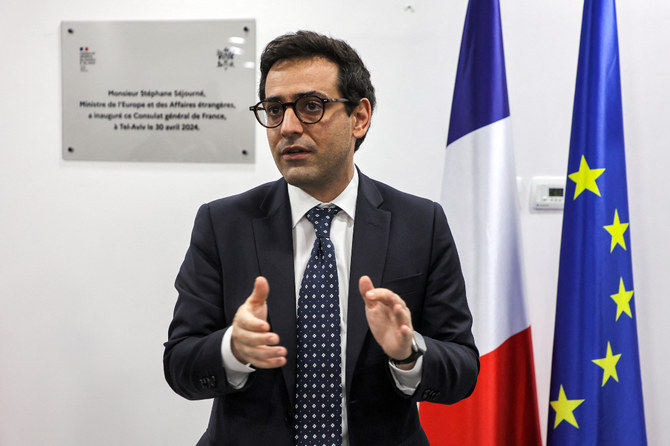
- Diplomatic efforts toward securing a ceasefire were intensifying following a renewed push led by Egypt
- France has three nationals still held hostage by Hamas after the group’s assault on Israel in October
TEL AVIV: France’s foreign minister arrived in Cairo on Wednesday on an unscheduled stop during a Middle East tour as efforts to secure a truce between Israel and Hamas and the release of hostages in Gaza reach a critical point.
Diplomatic efforts toward securing a ceasefire were intensifying following a renewed push led by Egypt to revive stalled negotiations between Israel and Hamas, Gaza’s ruling Palestinian Islamist group.
“The surprise visit of the minister is in the context of Egypt’s efforts to free hostages and achieve a truce in Gaza,” the source said.
France has three dual-nationals still held hostage by Hamas after the group’s assault on Israel on Oct. 7 and has worked closely with Cairo on providing humanitarian aid and medical assistance to Palestinians in Gaza.
Foreign Minister Stephane Sejourne’s trip to Egypt follows stopovers in Lebanon, Saudi Arabia and Israel.
In talks with Egyptian officials, he will assess whether those three hostages, who are not part of the Israeli military, could be on the list of people released and how close a deal actually is, French diplomats said, expressing cautious optimism on a potential truce deal.
Paris also wants to put a French proposal to defuse tensions between Israel and Lebanon’s Iran-backed Hezbollah high on the agenda in case a Gaza truce is agreed, diplomats said.
Sejourne, who met Israeli Prime Minister Benjamin Netanyahu in Jerusalem on Tuesday, said in an interview on Tuesday that there was some momentum toward an accord, but that it would only be a first step toward a long-term ceasefire.
He warned that an offensive in southern Gaza City of Rafah would do nothing to help Israel in its war with Hamas.
Trucks bringing bodies and detainees into Gaza hold up aid says UNRWA
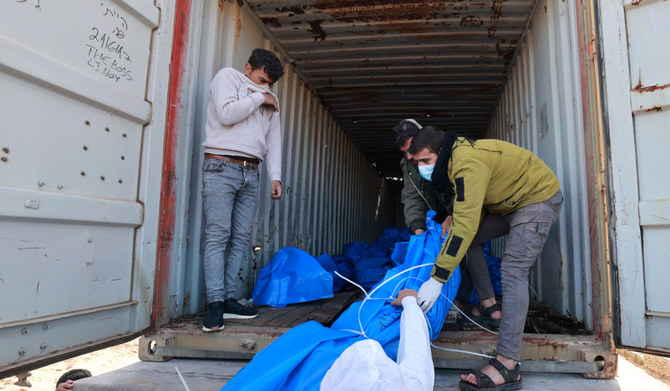
- Israel has killed more than 34,000 Palestinians, according to Gaza’s Health Ministry
- Asked for more details, UNRWA spokesperson Juliette Touma said that Israel had sent 225 bodies to Gaza in three containers since December that were then transported by the UN agency to local health authorities for burial, shutting the crossing temporarily
GENEVA: Trucks bringing both bodies and detainees from Israel back to Gaza through the main crossing point of Kerem Shalom regularly hold up aid deliveries, the head of the UN agency for Palestinian refugees said on Tuesday.
A deepening humanitarian crisis in Gaza has raised pressure on Israel to boost supplies into the enclave to curb disease among the 1.7 million people displaced by the Israeli-Hamas conflict and relieve hunger amid famine warnings from the United Nations.
UNRWA Commissioner-General Philippe Lazzarini told journalists on Tuesday that aid supplies into Gaza had improved in April but listed a series of ongoing difficulties including regular crossing closures “because they (Israel) are dumping released detainees or dumping sometimes bodies taken to Israel and back to the Gaza Strip.”
Asked for more details, UNRWA spokesperson Juliette Touma said that Israel had sent 225 bodies to Gaza in three containers since December that were then transported by the UN agency to local health authorities for burial, shutting the crossing temporarily. She did not have details of the circumstances of their deaths and said it was not UNRWA’s mandate to investigate.
On the detainee transfers, some of which have been previously reported by Reuters, she said that they had been transferred from Israel back to Gaza “dozens of times.”
Israel’s COGAT, a military branch in charge of aid, did not immediately respond to a request for comment. A spokesperson for the Israeli diplomatic mission in Geneva referred questions on the transfers to Jerusalem.
On aid deliveries, he said: “Mr. Lazzarini is deflecting from UNRWA’s own failures and responsibilities. Again today, there was a backlog of more than 150 trucks screened by Israel in Kerem Shalom not picked up by UN agencies.”
Tensions are high between Israel and UNRWA with the former accusing 19 UNRWA staff of involvement in the Oct. 7 Hamas attacks against Israel that killed 1,200 people and prompted the latter’s military campaign in Gaza. Israel’s allegations are being examined by UN investigators although a separate review found Israel has yet to provide evidence for accusations that hundreds of UNRWA staff are members of terrorist groups.
Kerem Shalom is one of just two crossings the UN says is currently open between Gaza and its neighbors Egypt and Israel.
Palestinian authorities have previously said that Israel has returned bodies from the Israeli-Hamas conflict after confirming they were not hostages. They said they were trying to identify them and figure out where they were killed.



